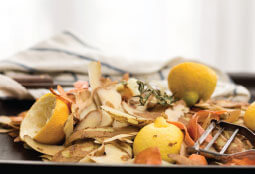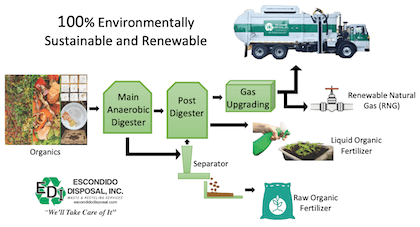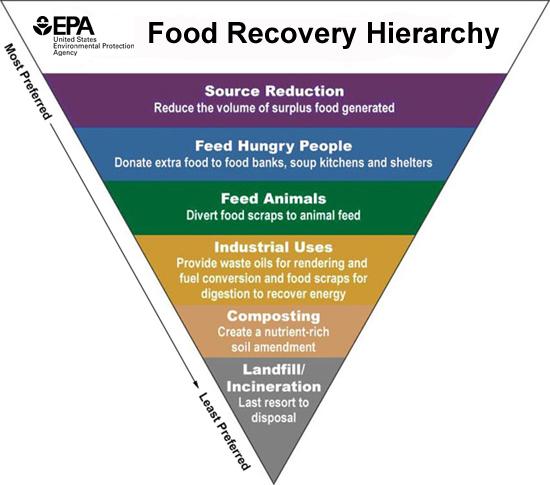EDI’s New Organics Recycling Program will Collect Food Scraps and Landscape Waste Mixed Together in a Green Organics Container
| Recyclable Organics Includes |
- grass clippings
- brush
- weeds
- hedge trimmings
- branches
- leaves
- palm fronds
- ice plant (in small amounts only due to weight)
|
- ivy
- flowers
- Halloween pumpkins
- Christmas trees (NO flocked trees)
- untreated and non-lead based painted wood
- food scraps
- food-soiled paper
|
Place recyclable organics directly into your designated green collection container. Do not use any kind of plastic bags (including certified compostable or biodegradable bags) for any type of green waste, food waste, or other organics collection or disposal, as they contaminate the Anaerobic Digester! All organic material must be placed loosely inside the green container for collection. Paper bags are acceptable.
Please do not place any of the following materials in your designated green organics recycling container:
- No plastic bags.
- No trash or hazardous waste.
- No animal waste.
- No dirt, rocks, asphalt, concrete, sand, etc.
- No treated or lead-based painted wood or lumber.
Organic Waste

Organic waste is a renewable natural resource, and it mainly comes from yard and kitchen waste from homes, food waste, and industrial and commercial operations scraps. Mandatory recycling of organic waste is the next step to achieving California’s Zero Waste goals.
Recycling organics will be easy and convenient with EDI’s commingled Organics Recycling program. EDI has expanded its source-separated green waste collection to include recycling food waste. The service will allow customers to place food scraps in the same container as green waste. EDI’s new Organics Recycling program will be a foundation for your community to achieve State mandates, including AB 1826, AB 1594, and SB 1383, which are directly related to organics recycling in the State of California.
EDI’s Anaerobic Digestion Facility
Since 1967, family-owned and operated EDI has had a long-standing commitment to reducing impacts on the environment through innovation. EDI’s state-of-the-art AD Facility began serving customers in early 2021, assisting your community to be in full compliance with State Mandates and keeping us On the Road to Zero Waste.
EDI’s Anaerobic Digestion Facility
AD is the natural process in which microorganisms break down organic materials such as food waste, green waste, fats, oils, and greases. Anaerobic digestion happens in closed spaces where there is no oxygen.
Recycling organics will be easy and convenient with EDI’s commingled organics recycling program. EDI has expanded the source-separated green waste collection to include the recycling of food waste. The service allows customers to place food scraps in the same container as green waste. EDI’s AD Facility is a foundation for your community to achieve State mandates, including AB 1826, AB 1594, and SB 1383, which are directly related to organics recycling in the State of California.
EDI’s Anaerobic Digestion and Food Waste Recycling Videos
To learn more about EDI’s new AD Facility and Organics Recycling Program and how they will significantly impact the future of organic waste, please watch our informative videos.
Why Recycle Food Waste?

Organic waste accounts for over 40% of the material in California’s waste stream. Organic material cannot break down when buried in a landfill, as it would in nature or in a compost pile. Instead, it decomposes without oxygen, releasing methane gas into the atmosphere.
Organic material (food scraps and yard waste) will soon be recycled when placed in green carts and then transported to EDI’s AD Facility, once completed, where it will be converted into renewable natural gas and fertilizer.
What Will Go in the Green Cart
Below are just a few examples of what will be able to be placed in your green organics cart.
Food Scraps
Fruit, vegetables, meat, bones, dairy, eggshells, prepared food

Food-Soiled Paper
Napkins, tea bags, paper plates, coffee filters

Yard Waste
Plants, leaves, branches, grass


What Can You do Now?
In the United States alone, a shocking 40% of food is uneaten, wasted, and discarded. We as consumers are the largest producers of food waste, believe it or not, exceeding grocery stores and restaurants combined! So, the smallest changes add up and make a huge difference. San Diego Food System Alliance is leading an initiative across San Diego County to reduce food waste and increase food donations to people. By visiting their website, at sdfsa.org/savethefoodsd/, residents can find information on food recovery throughout the county, food donation guides, and resources.
AB 1826 – California’s Commercial and Multi-Family Organics Recycling Mandate
AB 1826 requires businesses and multi-family properties that generate organic waste to arrange for recycling services for that waste, and for jurisdictions to implement a recycling program to divert organic waste from businesses and properties subject to the law, as well as report to the State of California on their progress in implementing an organic waste recycling program.
SB 1383 – Short-Lived Climate Pollutant Reduction Strategy of 2022
SB 1383 establishes targets to achieve a 50% reduction in the level of the statewide disposal of organic waste from the 2014 level by 2020 and a 75% reduction by 2025. The law grants CalRecycle the regulatory authority required to achieve the organic waste disposal reduction targets and establishes an additional target that not less than 20% of currently disposed of edible food is recovered for human consumption by 2025.
EDCO can conduct free on-site visits to help businesses and multifamily properties comply with the state’s new mandatory recycling requirements. Contact our Customer Service office by phone or submit a fast and easy online request to arrange for organic waste recycling services.
AB 827 – California’s Commercial Recycling and Organics Container Mandate
Effective July 1, 2020, MCR and MORe-covered businesses must provide organics and recycling containers for customers to collect waste generated from products purchased and consumed on the premises (AB 827, McCarty). These containers must be placed adjacent to the trash and be visible, easily accessible, and clearly marked.
AB 827 requirements were added to existing AB 341 and AB 1826 requirements. The new law, passed in 2019, builds off existing requirements under these two laws.
- This law targets businesses that sell products meant for immediate consumption.
- Full-service restaurants do not have to provide properly labeled containers for patrons but must provide properly labeled containers next to trash containers for employees to separate recyclables and organics for customers.
Food Waste Prevention
Click here for information on a local Food Rescue Program and Food Bank.
In the United States alone, a shockingly 40% of food is uneaten, wasted, and thrown out. This results in an unfortunate misuse of resources needed to grow, process, and transport food while wasting money and accelerating climate changes. We as consumers are the largest producers of food waste, believe it or not, exceeding the grocery stores and restaurants combined! So, the smallest changes we make add up and make a huge difference. Preventing food waste in the first place typically offers the most significant financial and environmental benefits. Below are some food waste prevention tips from Save The Food:
- Shop wisely: Plan your meals for the week in advance. Shop with a list. Stick to the list and avoid impulse buys.

- Proper portions: Don’t buy or serve more than you need.
- Love your leftovers: While you’re planning your meals, prepare for nights when you’re likely to go out to eat and when you might have leftovers from earlier meals. Get creative to give leftovers another life. They are the start of a casserole or soup the day after.
- Freeze it: Frozen food will keep longer. Almost anything can be frozen! But portion out, label and date your food so that it’s easy to serve later.
- Shop your kitchen before the store: Check the fridge, freezer, and pantry for items that need to get used up before you splurge on new things.
- Don’t fall for date labels: Food doesn’t immediately spoil as soon as the date on the package has passed. Sell-by, use-by, and best-by dates are generally manufacturers’ suggestions for when an item is likely to be at its peak quality.
- Spread the word: Engage friends, family, community, and businesses in food-saving practices. Share your favorite tips with your friends and family. Encourage your local restaurants and grocery stores to avoid excessive portions and package sizes, and tell them it is ok if they run out of an item at the end of the day (so that they can avoid over-purchasing). Teach kids to value food and not to waste it.











